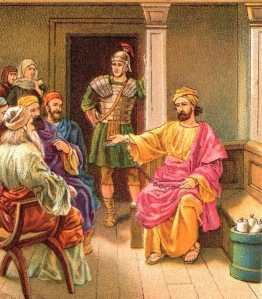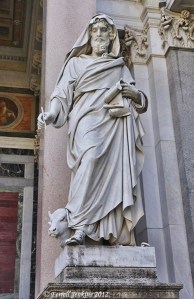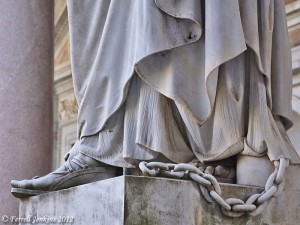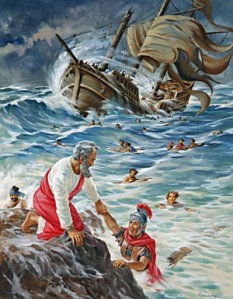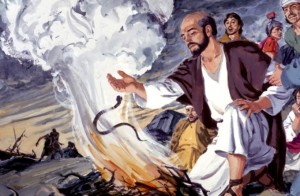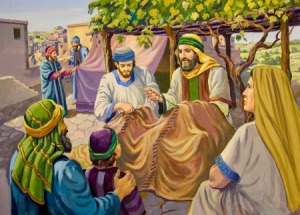2013 is a very turbulent year, not only here in South Korea and the Philippines, but the whole world as well. Here in South Korea, the country suffers household debt crisis, international tension both with Japan and North Korea, domestic conflict among labor unions, and increasing headache in search of fund for welfare program.
In the Philippines, we were afflicted by corruption in government, rebellion, and natural disasters such as earthquake and super typhoon.
Moreover, the whole world, both countries and their people has amassed huge debts and under threat of bankruptcy. And add to it the increasing amount of printed paper money awaiting for an economic catastrophe. With these loads of problems, we end 2013, and we greet each other with a happy and prosperous 2014!
I think there is no better way to end 2013, and start 2014, than to remind ourselves that despite of what’s happening in and around us, Christ is still on his throne and his claim that all authority in heaven and on earth is his remains true.
Many Christians today no longer believe this. They think that simultaneous with the decline of Western civilization, Christianity will also decline with it. They describe our time as post-Christian. In other words the gospel of Christianity is retreating from the center stage of human civilization, and there is nothing we can do to reverse it. The message of the gospel is considered irrelevant in a time that is increasingly characterized by dependence on either the power of the state or the power of the people.
During the 16th century Reformation, the gospel occupied the center stage of human culture and society. Prior to that period, there was widespread ignorance about the gospel. Protestant church historians describe it as dark age. The church and its tradition covered the truths of the Bible and replaced it with human works and superstition to attain one’s salvation.
Acts 27 and 28 describe how the gospel penetrates Rome, the center of world’s power during the first century. This story teaches us that the gospel is not something to be hidden in a remote place; it must govern the life of the public, and of all nations. And this task lies on the shoulder of the Church of Jesus Christ. As followers of Christ, our duty is to bring this gospel back into the center stage of human society. That was Paul’s mission: to proclaim Christ’s global reign, and that too is our mission. To achieve this, the apostle Paul had to go to Rome.
In this story, what lessons can we learn about the ways God uses his servant to proclaim the global rule of Christ?
I just want to limit my answer to three lessons.
1. God has his own procedure in using his servant.
Reading the ministry of the apostle Paul from the book of Acts, you will notice that there were some Jews who were so envious of his ministry, and distorted his teachings. Wherever the apostle Paul goes, they also follow him stirring up the crowd against him. Finally, they took advantage and seized him when Paul arrived at Jerusalem. They wanted to kill him, but the Roman commander intervened and arrested him instead.
Paul appeared before the Sanhedrin, transferred to Caesarea, and had undergone trial before governor Felix, and before governor Festus and King Agrippa. King Agrippa personally believed that Paul didn’t deserve death or imprisonment. He even told governor Festus that Paul could have been set free if he had not appeal to Caesar.
And since Paul appealed to Caesar, he was handed to a centurion to transport him to Rome together with other prisoners. I think Paul was taking this as an opportunity to bring the gospel to Rome.
However, notice in this story the procedure of God in bringing the gospel to Rome: God was sending his servant in chains. In the eyes of the world, Paul was a prisoner, a “law breaker,” a “criminal.” Perhaps, the apostle preferred preaching the gospel not as a prisoner, but as a freeman. But that was God’s chosen way; that was God’s procedure.
Paul surrendered himself to the will of God. He followed God’s way. He was willing to go to Rome to preach the gospel there even in chains.
The lesson here is clear. Do you want to be used by God? However, do you want to be used in your way or in his way? Are you willing to follow God even though his chosen way or procedure is different from the one you expect?
It had been Paul’s desire to bring the gospel to the capital of the world-empire. The gospel had to have a place in the center of the world; all earthly authority would have to be made subject to the sovereign rule of Jesus Christ. This was the apostle Paul’s passion.
Likewise, as followers of Christ, you should not be satisfied that the gospel of Jesus Christ is being dismissed as a Sunday or religious affair and has nothing to do with public life such as issues related to economics and politics. In fact, with the existing crises that we have, you should pray and study the Bible until you are convinced that the real answer is found only in the gospel of Jesus Christ. Amen!
2. God is sending his timely word to provide guidance and protect his servant.
The way chosen by God is not easy. The apostle Paul had a near-death experienced on his voyage to Rome. The centurion, Julius did not listen to his warning. The centurion followed the advice of both the captain and the ship owner and launched into a very dangerous voyage.
It was winter that time. Along the shore of Crete, a hurricane came. The ship was caught by the storm, and suffered violent battering. For many days, Paul and his companions did not see the appearance of sun and stars, making it impossible to determine their position, and had gone without food. They gave up all hope of being saved. They thought, that was the end of their lives.
There are times that even you are faithfully obeying God, you will encounter experiences that you don’t expect no matter how cautious you are. During those times, you think, that’s the end of you; you give up all hope. God’s plan is difficult to understand why his servant has to suffer in order to fulfill his will. However, our comfort is that God sends his timely word to provide guidance and protect his servant.
In 27: 23-24, Paul said, “Last night an angel of the God whose I am and whom I serve stood beside me and said, ‘Do not be afraid, Paul. You must stand trial before Caesar; and God has graciously given you the lives of all who sail with you.'” What a timely word for those who gave up all hope. They needed to hear that.
It is so difficult to experience that in facing your hardest trial in life, and you are seeking for timely words, but find instead, insensitive and condemning words. Blessed are those who experience great trials and find people speaking the timely word of God. Such word gives hope, courage, and strength. Amen!
3. God provides for his servant’s needs.
In this story, we find several instances of God’s provision. First, on his voyage to Rome, Paul either had no or little provisions with him. God granted him favor in the eyes of Julius, the centurion, and allowed him to visit some of his friends at Sidon. Paul’s friends provided for his needs (27:1). This is one evidence of God’s provision. Another evidence of God’s provision happened when they landed on an island called Malta (28:1). The people in the island showed unusual kindness to them. And the third instance that God provided for Paul’s need when they met a public official of the island, Publius. Publius welcomed Paul and his companions to the former’s home and entertained them for three days hospitably (28:7). And then finally in 28:10, we read that the people in the island after witnessing the healing power of God through Paul, they provided the apostle and his companions with all the supplies that they needed.
The apostle Paul and his companions remained on Malta for three months. Then they boarded a ship from Alexandria with the figurehead of the twin gods Castor and Pollux, which had spent the winter on the island. Now the voyage went smoothly. At Syracuse they stayed three days, and then they traveled on over Rhegium to Puteoli where they found some brethren. At their invitation they stayed with them for seven days.
Meanwhile, the brethren in Rome had heard that Paul was coming. When Paul arrived in the vicinity of Rome the brethren came out to meet him. This meeting made a deep impression on Paul. He had reached the goal of his journey. It was mission accomplished.
The apostle Paul depended on God to supply his needs going to Rome simply because he was a prisoner. There’s no way for him to do his tentmaking in order to provide for his needs. He had to depend on his friends and to those whose hearts God had touched.
With the existing economic situation in the Philippines, I think unless a Filipino pastor has a membership of 50 families earning at least 15,000 PHP each and faithfully giving tithes to the Lord, there is no way a pastor can provide for the needs of his family. And failing to provide for the family is a bad testimony to the community. And that is why many Filipino pastors are resorting into tentmaking (Acts 18:3) to provide for their families.
One of my goals in coming here to South Korea is to raise a tentmaking capital. I am still praying for the details. And then, God willing, by 2015, either I will start again a new ministry or accept a church invitation. I still do not know. Help me pray for this.
I believe that if God is calling his servant into the ministry of preaching and teaching the word, he will also provide for his servant’s needs. It could be in the form of tentmaking or through the generosity of the members of the church.
Conclusion:
There are times that despite of your obedience, God allows some things to happen that are difficult to understand, things that we do not expect. During those times, we lose hope, and as if you cannot find the word suitable to your situation. And also during those times, you suffer lack and you worry about the economic future of your family.
From the experience of the apostle Paul, we learn that when God is calling a man to proclaim the global rule of his Son, God himself chooses his own method, his own way, his own procedure; God sends his timely word to bring guidance and protection, and; God is faithfully providing for his servants’ needs.
These lessons are not only applicable for pastors or ministers of the gospel. I believe that similar lessons are applicable to all members of the body of Christ. When God is calling you to do something, remember that there are times that God’s way is different from your way; that God will never leave you without guidance and protection, and; that God is faithful to provide for all your needs so that you will abound in every good work. Amen!
Happy 2014!





